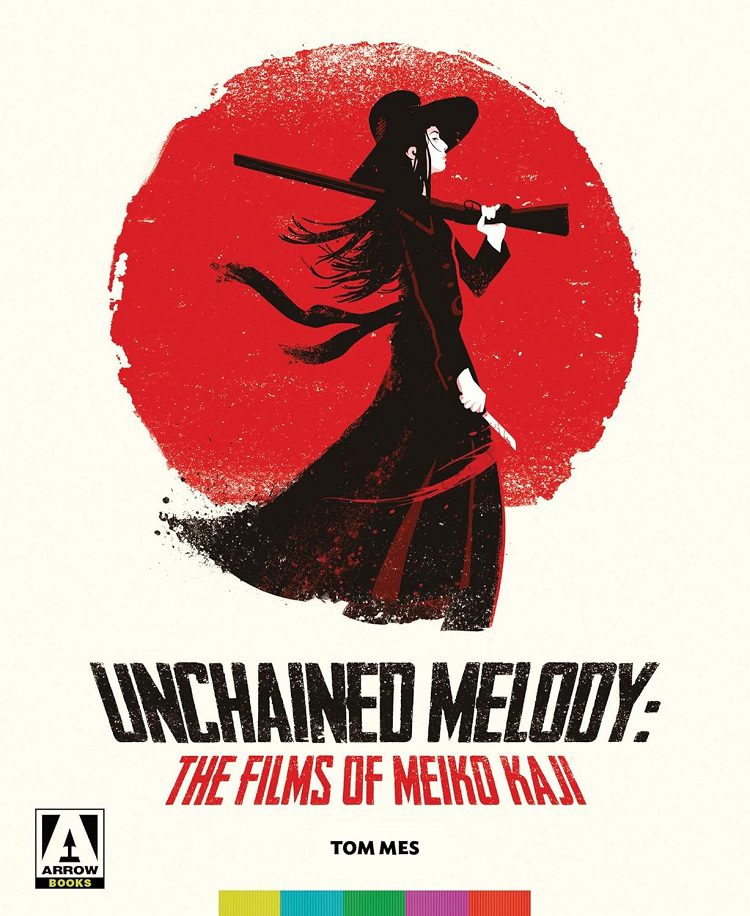
To much of the post-Millennium western cinematic audience, Meiko Kaji was introduced with her voice. Both the theme songs from Lady Snowblood and Female Convict Scorpion were featured in Kill Bill. More than that, Kill Bill‘s story, structure and visual style (at least in the section in Japan) were all heavily influenced by Lady Snowblood. Ironically enough, though Meiko Kaji did have a successful singing career in the ’70s, her most influential contributions have been visual: the way she looked, the way she dressed, embodied a fierce determination and independence that made her stand apart from other Japanese film actresses of her day.
That day was the late ’60s and the ’70s, and the story of her film work is the subject of Tom Mes’ Unchained Melody: The Films of Meiko Kaji. It is not strictly a biography of the actress, but a critical overview of her career in films, while touching upon her TV and music careers as well. While her most indelible images may be the long coat and hat worn by Nami, the Scorpion, and her white kimono splattered red with blood from Lady Snowblood, Mes uncovers that there was much more to her career than playing nearly mute avengers of male perfidy.
Born Masaka Oto in 1947, after doing some modeling work Meiko started out in films at Nikkatsu, Japan’s oldest film studio, in 1965. While her early roles were generally as traditional Japanese good girls, her personal character was defiant and independent, which gave her trouble at times with studios and directors who expected more subservience. The story of ’60s and ’70s Japanese cinema is the story of an industry that was slowly strangling from the advent of television. Sure-fire genres and movie series weren’t nearly as sure-fire anymore, and many of the big studio stars were moving on to television. Nikkatsu began to turn away from traditional genres and exploring youth-oriented movies with gritty contemporary settings and a counter-cultural perspective.
It was in the Meiko Kaji headlining series Stray Cat Rock where her star-power really started to shine. Five films only thematically connected, Meiko Kaji plays the head of a girl biker gang in three of them, and does it without the self-parodying bluster that is the hallmark of Japanese “tough girl” roles. She’s cool confidence and fuming passionate anger. That confidence and hard-headedness was reflected in her choice of roles, and the way she played them.
Mes organizes the book mostly chronologically, and roughly one third of its content is about the major series that helped solidify Kaji’s image: Stray Cat Rock, Female Prisoner Scorpion, and Lady Snowblood. Each chapter on her films also contains a short profile of the directors who were instrumental in her career. Mes’ reviews are insightful, taking into account the context of not only the actress’s career but the politics involved, both in the film studio and in Japanese national affairs. But he does so without authorial intrusion or tendentious theorizing that can make some film writing a real chore.
Unchained Melody is another entry in a series of books about film and popular culture by the new Arrow Books publishing imprint of Arrow Films. It’s a lovely looking little paperback with color and black and white photos throughout. The trim size of the book is a little unusual, fittingly the same size as the booklet (and books) Arrow has produced for some of their most elaborate movie box sets, being about the same size as a Blu-ray case.
The author, Tom Mes, is a veteran film critic and specialist in Japanese cinema. He wrote for the late and lamented Midnight Eye website, is the author of books on Takashi Miike and Shinya Tsukamoto as well as, with Jasper Sharp, the indispensable Midnight Eye Guide to New Japanese Film. Unchained Melody: The Films of Meiko Kaji is a welcome addition to the growing library of books in English on Japanese film.